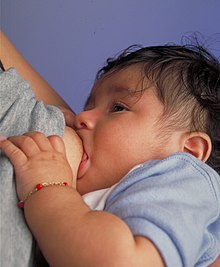This is the final week of the US Breastfeeding Committee's
20 Actions in 20 Days Campaign. Today's action step is one that is a high priority for us at A Nurturing Moment - such a high priority, in fact, that we have an entire program designed to help employers in this area!
Today's step comes from pages 50-51 of the
Surgeon General's Call to Action to Support Breastfeeding.
Action 14. Ensure that employers establish and maintain comprehensive, high-quality lactation support programs for their employees.
In the United States, a majority of mothers have returned to the workplace by the time their infants are six months old. Continuation of breastfeeding after returning to work is facilitated if the employer offers a lactation support program. The evidence demonstrates that supportive policies and programs at the workplace enable women to continue providing human milk for their infants for signfiicant periods after they return to work. High-quality lactation programs go beyond just providing time and space for breast milk expression, but also provide employees with breastfeeding education, access to lactation consultation, and equipment such as highgrade, electric breast pumps. Currently, only a quarter of U.S. employers provide breastfeeding employees with a place to express breast milk at the workplace.
Implementation Strategies
Develop resources to help employers comply with federal law that requires employers to provide the time and a place for nursing mothers to express breast milk. As part of the Affordable Care Act enacted in 2010, the Fair Labor Standards Act was amended to require employers to provide reasonable break time and a private place for nursing mothers to express milk while at work. Programs are needed to educate employers about the new law, supply examples of how it can be implemented in a variety of work settings, and provide assistance to businesses that find compliance difficult.
Design and disseminate materials to educate employers about the beneits of providing
more comprehensive, high-quality support for breastfeeding employees. The Health Resources and Services Administration resource kit,
The Business Case for Breastfeeding: Steps for Creating a Breastfeeding Friendly Worksite, is one model of how to promote employer support for breastfeeding employees. Developing Web sites, videos, conference exhibits, and peer-to-peer marketing strategies could all be useful for expanding the use of lactation programs and implementing effective programs across a variety of work settings. New materials that focus on the unique concerns of non-office work environments and workplaces with few employees should be developed.
Develop and share innovative solutions to the obstacles to breastfeeding that women face when returning to work in non-office settings. While there are numerous examples of creating lactation rooms in office buildings and large stores, many work environments are more challenging for breastfeeding women returning to work. For example, farm workers may find it difficult to access a private place shielded from public view. Service workers who are on the road may not have a regular workplace where they can express milk. Challenges also exist in allowing break time for breast milk expression in businesses where there are few employees to cover during breaks. Many employers have already worked with workplace lactation consultants to develop innovative solutions, such as special trailers, makeshift temporary spaces, or “floater” employees, to enable nursing mothers to take breaks.
Promote comprehensive, high-quality lactation support programs as part of a basic
employee beneits package. There are cost savings from better retention of experienced workers, higher employee morale, greater loyalty and productivity of employees, reduction in absenteeism and sick leave taken by parents of young children, and lower costs for health care and health insurance. While the percentage of employers having lactation support programs has increased over the past decade, many women still find it difficult to combine breastfeeding with work.
Getting Involved
If you've been around A Nurturing Moment very long, you probably know how committed we are to supporting working mothers. We often consult with moms who are returning to work to help them figure out how they will manage pumping and working. We've worked with mothers in a wide variety of industries and love to help them make continued breastfeeding a success.
Last year we began a
special program designed specifically to help employers support their nursing employees - just like the last point of the Surgeon General's call suggests!
ANM Workplace Solutions is available to any company in the Tennessee Valley who wants to offer exemplary support. We provide an on-site support group, hospital grade breast pumps, and in-home lactation consultation for employees! If your company isn't offering you this kind of support, then have your HR people get in touch with us! We'd love to help!
 I had the privilege of meeting Caroline Bradford today when she dropped by the store to give me information about the Rise School of Huntsville that will open on January 9. As she described the concept to me, I was absolutely fascinated, and couldn't wait to share it with all of you!
I had the privilege of meeting Caroline Bradford today when she dropped by the store to give me information about the Rise School of Huntsville that will open on January 9. As she described the concept to me, I was absolutely fascinated, and couldn't wait to share it with all of you! They use the Creative Curriculum, the most successfully researched curriculum designed to meet the needs of all children in an integrated environment. The ratio of special needs children to typical children is 50:50. They make sure that there is one adult for every 2-4 children to ensure that each child receives as many learning opportunities as possible.
They use the Creative Curriculum, the most successfully researched curriculum designed to meet the needs of all children in an integrated environment. The ratio of special needs children to typical children is 50:50. They make sure that there is one adult for every 2-4 children to ensure that each child receives as many learning opportunities as possible.


























